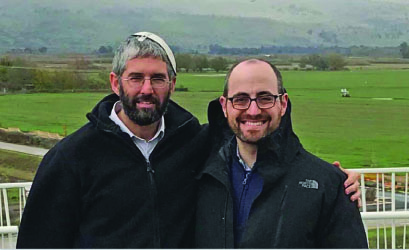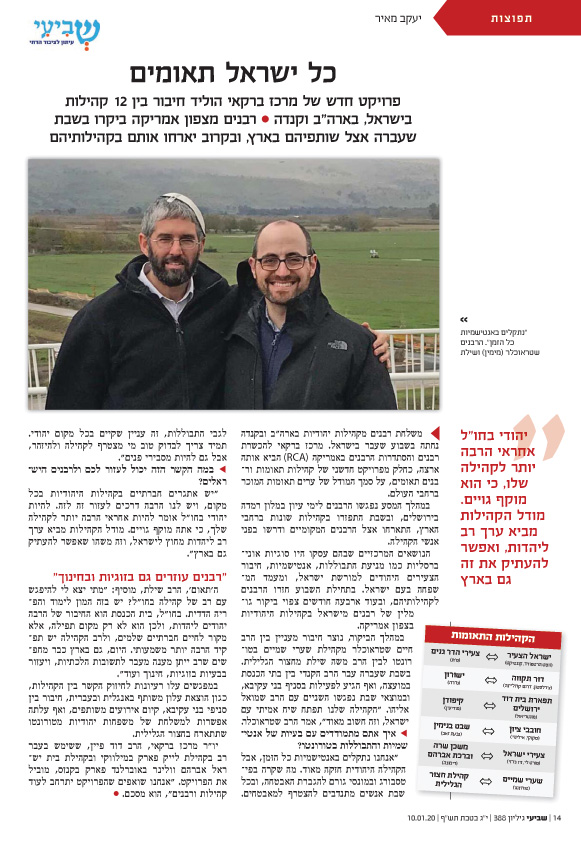A NEW BARKAI CENTER PROJECT LED TO THE CONNECTION BETWEEN 12 COMMUNITIES IN ISRAEL, THE US AND CANADA.
LAST SHABBAT, RABBIS FROM NORTH AMERICA VISITED THEIR PARTNERS IN ISRAEL, AND WILL SOON BE HOSTING THEM IN THEIR OWN COMMUNITIES.

A delegation of rabbis from Jewish communities in the US and Canada landed in Israel last week. The Barkai Center for Rabbinic Training and the Rabbinical Council of America brought the delegation to Israel as part of an innovative program pairing communities and rabbis, based on the sister-city model known around the world.
During their trip, the rabbis attended seminars at Jerusalem’s Ramada Hotel, and on Shabbat dispersed and went to different communities around the country, staying with local rabbis and giving sermons to members of their communities.
The main topics they dealt with were universal issues such as the prevention of assimilation, anti-Semitism, connecting young people to Judaism and Israeli heritage and the status of the family within the people of Israel. The rabbis returned to their communities at the beginning of the week, and four months from now a reciprocal delegation of Israeli rabbis is expected to visit Jewish communities in North America.
During the visit, an interesting connection was formed between Rabbi Chaim Strauchler of Toronto’s Shaarei Shomayim community and Rabbi Moshe Shilat of Hatzor HaGlilit. Last Shabbat, the Canadian rabbi visited the community’s synagogues and attended a Bnei Akiva activity, and the two met with Rabbi Shmuel Eliahu on Motza’ei Shabbat. “Our community will open a real dialogue with Israel, and that’s very important,” said Rabbi Strauchler.
How do you cope with anti-Semitism and assimilation in Toronto?
“We encounter anti-Semitism all the time, but the Jewish community is very strong. The events in Pittsburgh and Monsey have led to increased security, and every Shabbat people are volunteering to join the security guards. As for assimilation, that’s an issue that exists in every Jewish place. We always need to carefully check who is joining the community and be careful, but at the same time be welcoming.”
How can this connection help you and the Israeli rabbis?
“There are social challenges in Jewish communities everywhere, and we have many ways of helping each other. Being Jewish abroad means being much more responsible for your community, because you’re surrounded by gentiles. The community model provides much value to Judaism outside of Israel, and that’s something that can be copied in Israel too.”
“Rabbis also help with relationships between couples and education”
Rabbi Shilat’s “twin” adds: “When was the last time I had the opportunity to meet with a rabbi from a Jewish community abroad? This offers much mutual learning and benefit. Abroad, the synagogue serves as the connection many Jews have to Judaism, and therefore it’s not just a place of worship, but rather the basis of an entire social life, and the community rabbi plays a much more significant role. Today, even rabbis in Israel are being asked to do more than just answer Halakhic questions, including help with relationships between couples, education and so on.”
Ideas for strengthening the bonds between the communities were brought up at these encounters, such as publishing a joint newsletter in English and in Hebrew, connecting branches of Bnei Akiva and holding joint events, and it was even suggested that a delegation of Jewish families from Toronto be hosted in Hatzor HaGlilit.
Barkai Center Chairman, Rabbi David Fine, who served as rabbi for the Lake Park community in Milwaukee and the Beth Israel Abraham and Voliner community in Overland Park, Kansas, is heading the project. “We hope the project expands to more communities and rabbis,” he sums up.
“A Jew abroad is much more responsible to his community because he is surrounded by gentiles. The community model provides much value to Judaism outside of Israel, and that’s something that can be copied in Israel too.”


